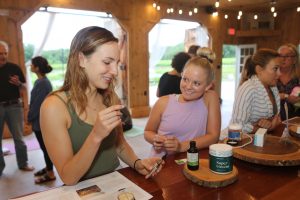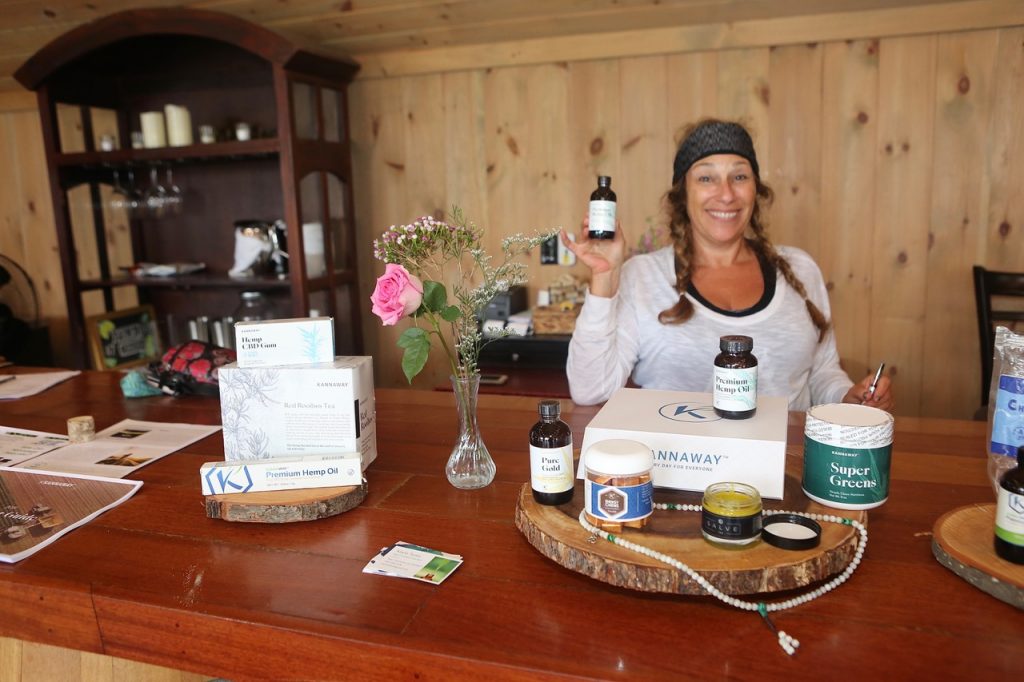CBD is good for business and,
proponents say,
good for your health
By Alix Boyle
Photography by TODD FAIRCHILD
Before taking CBD, Denise couldn’t complete tasks like grocery shopping or make decisions due to anxiety. She was even treated in the emergency room for an anxiety attack.
Denise W. says that taking cannabidiol, or CBD, one of the many active compounds found in marijuana or hemp plants, has been “life-altering.”
“I tried a tincture and within an hour I felt a difference,” says Denise, who grapples with anxiety. After taking a water-soluble CBD liquid twice a day for a few weeks, and a CBD gummy as needed, Denise felt her anxiety significantly reduce. Before taking CBD, she couldn’t complete tasks like grocery shopping or make decisions due to anxiety. She was even treated in the emergency room for an anxiety attack.
“My anxiety level went from a 15 out of 10 down to a three,” says Denise, who lives in the Greater New Haven area and did not want her full name used. “I researched CBD for a year. Why did I wait so long to take it?”
Denise was shopping recently at Your CBD Store in Milford, buying another month’s supply. A 1,000-milliliter bottle costs $110 and lasts for about a month, said Chief Operating Officer and General Manager Clayton Percy. The spa-like shop, decorated with comfy couches and soothing baby-blue paint on the walls, carries all things CBD – everything from tinctures and oils to lip balm, bath bombs, pet items, and so much more.
On a recent weekday morning, shoppers peppered Percy with questions about CBD and tried samples of CBD cream meant to reduce pain. He spoke with some customers for 20 minutes or more, patiently answering every query. Your CBD Store is part of chain of more than 400 stores nationwide that carry CBD products derived from hemp, a marijuana plant that is bred to be low in tetrahydrocannabinol (THC), the chemical in marijuana that causes the high people experience when they use it. If the plant creates 0.3 percent THC or less, it is called hemp; if it makes more than 0.3 percent THC, it is called marijuana. Both plants are in the cannabis genus.
CBD has been touted as a panacea for pretty much everything: pain management, mental health conditions, inflammation, physical ailments including arthritis and migraines, and Post Traumatic Stress Disorder. It’s sold pretty much everywhere, including gas stations, gyms, and your local Bed, Bath and Beyond.
At Your CBD store, a woman who identified herself as having Parkinson’s disease said she had less pain, less anxiety, and was able to walk more quickly after sampling CBD. She was returning to the store for more.
But, with one notable exception, CBD is not approved by the U.S. Food and Drug Administration (FDA). In 2018, the FDA approved Epidiolex, a drug for Dravet and Lennox-Gastaut syndromes, difficult-to-treat forms of epilepsy. It contains high levels of CBD.
All the products at Your CBD Store are made by a company called Sunflora. The plants are grown in Colorado and certified by the state Department of Agriculture. The company touts its carbon dioxide extraction process that eliminates the need for harmful chemicals and solvents.
The bottles are labeled with QR codes, leading the customer to a website with third-party testing for the product, showing the strength of CBD in the product and listing all the trace chemicals.
Third-party testing is a key to knowing what you are getting in the CBD world, says C. Michael White, professor of pharmacy practice in the UConn School of Pharmacy. White recently published a paper on human studies of CBD’s therapeutic actions and potential in the Journal of Clinical Pharmacology.
“It is impossible to reliably tell how much CBD or THC is in a product unless it is verified by an outside laboratory,” White says. “The concentrations of CBD (or THC for that matter) the manufacturer puts on the label are very often a work of fiction, not reality. Many products you buy in smoke shops or over the Internet have little to no CBD in them and some have more CBD than they disclose. If it is verified by an outside laboratory, the product label will refer you to a certificate of analysis that they have on file.”
White urges people who want to try CBD to first discuss with their doctor and pharmacist how CBD might interact with prescription medication they are already taking.
“One important risk is that CBD is broken down in the body by the liver and also impacts how other drugs are broken down by the liver as well. This means there is a risk of serious drug interactions with CBD products,” White says.
CBD can also cause sleepiness and lethargy, so it’s best not to drive after using it until you know how it affects you.
And as far as the legalities are concerned, check to be sure your CBD does not contain more than the allowable 0.3 percent amount of THC.
“Outside of a medical marijuana dispensary-created product, if you use a CBD product that has more than 0.3 percent THC, even if you didn’t know it had it, you could be arrested for possession of marijuana in Connecticut or when traveling across state lines,” White says. “There are cases of two grandmas who got busted in the spring for possession of marijuana when drug sniffing dogs detected the THC in the CBD product. One was arrested at a Disney amusement park and another at an airport.”
Dana Krete, an acupuncturist and naturopathic physician at the Wellness Center at Privé Swiss in Westbrook, has seen her patients have great success using topical CBD for pain relief. “I was treating a patient with acupuncture for knee pain from arthritis. She used the oil and got four solid hours of pain relief,” she says.
After researching various CBD products, Krete began carrying them in the clinic and has been recommending the topical cream for patients for a year, and using the oil for eight months. Krete says there are plenty of studies showing the efficacy of CBD for ailments including anxiety and schizophrenia.
Despite its benefits, there is little reason for the drug industry to spend the money to do phase three clinical trials on CBD, necessary to bring CBD to the public, because it is not patentable. Phase three trials involve thousands of patients and can take years to complete.
Krete believes CBD works for pain, inflammation, anxiety and insomnia, and also helps in regulating digestion. She stresses that patients should use CBD as part of an overall treatment plan.

“It is the most reliable thing I’ve used for pain,” Krete says. “As in anything, you have to make sure you are getting it from a good quality source. It can be hard to figure out.”
Kayla Tyska, a shoreline yoga instructor, hosts pop-up CBD events that include education about CBD, a yoga class, and the opportunity to try a CBD salve. Tyska believes CBD has improved the quality of her life so much, specifically improving shoulder tendonitis, that she started selling CBD products to her clients and others.
“I’m a walking CBD dispensary,” she says.
Tyska first learned about CBD in high school when a classmate was taking it to help improve Crohn’s disease. She began taking 50 milligrams a day six months ago after being reintroduced to it by a health coach and author.
Tyska represents the Kannaway brand and says it’s important to get CBD from a reliable source.
“Hemp is a bio accumulator and will absorb all the chemicals in the soil around it,” Tyska said. “Kannaway is one of 13 companies that has the seal from the U.S Hemp Authority Certification Program. There’s no standardized testing in this industry. Ninety percent of labels are wrong.”
The Kannaway plants are grown in Switzerland, which has more stringent laws about chemicals used on plants than the U.S., and Tyska believes it is some of the purest available.
In addition to using CBD products for themselves, people are also giving them to their pets.
Ellen Botwin, a consultant and retired special education teacher who lives in Guilford, gave CBD oil to her beloved border collie, Archie, who lived to be 15 years and 5 months. The last two years of his life, he had trouble walking, getting up and seemed to be stiff with hip pain. She tried acupuncture and swim therapy, to no avail.
Botwin already had a medical marijuana license and was taking CBD for back pain as well as PTSD. She gets her product from a dispensary and believes it’s a pure, unadulterated medical-grade product. She calibrated the dose of CBD for Archie based on his weight and her knowledge of how much she takes based on her own weight.
“At that time, vets were not allowed to prescribe CBD for dogs or even give an opinion,” Botwin says. “I heard vets in California were prescribing CBD, so I just tried it. Sure enough, he was much spunkier and acted like the dog we knew. It was an amazing change. We gave Archie another year of life.”
Chelsea Casper of East Berlin, a hospice worker, vapes CBD oil and feels that it elevates her mood and helps with anxiety and insomnia. She gives CBD-infused dog treats to Penelope, her Shiba Inu, especially before a bath or long car ride. The treat seems to make her a little sleepy, a good thing for this high-energy pooch.
“I think it’s a miracle drug, and I’m lucky that I can afford to pay for it,” Botwin says. “I wish it were available to everyone.”









More Stories
Coming Out Later In Life
Staying Connected
Swipe Rights & Wrongs